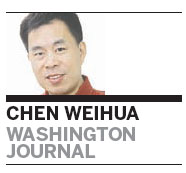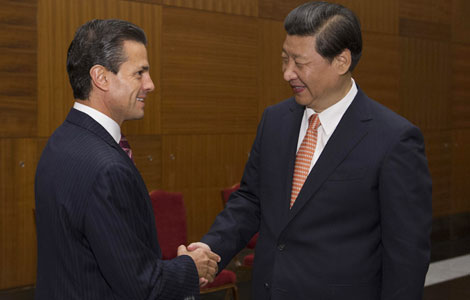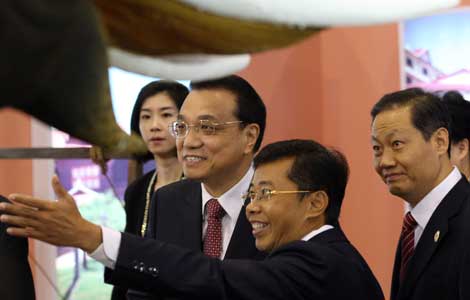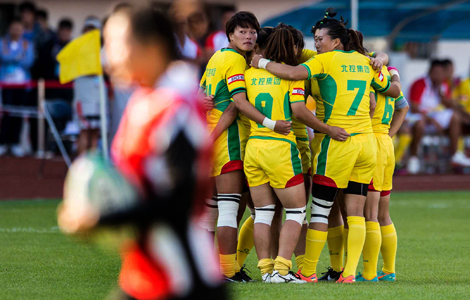|
|||||||||

While China's role in Africa is often controversial in the West and China-US ties in the continent often called contentious, two papers released last week shed light on the vexing issues.
One is from the Brookings Institution on a trilateral dialogue between China, the United States and Africa; the other is a white paper on China-Africa economic and trade cooperation issued by the information office of China's cabinet, the State Council.
Describing the China-Africa relationship as "mutually beneficial," the white paper said "China-Africa economic and trade development has improved people's livelihoods and diversified economic development in African countries, and provided strong support for China's social-economic development".
China has replaced the US as Africa's largest trade partner. In 2012, China-Africa trade hit $198.5 billion, after annual growth of 19 percent from 2009 and accounting for 16 percent of the continent's trade with the rest of the world.
The paper pointed out the great potential for bilateral trade and said China will take multiple measures to promote it, including implementation of a special plan on trade with Africa which will expand the scope of zero-tariff treatment for African goods exported to China.
Since January 2012, the 30 least developed African nations that have diplomatic ties with China have been granted zero-tariff treatment for 60 percent of their exported items.
The Chinese government also encourages and supports companies and financial institutions to increase investment in Africa. China's foreign direct investment in African nations increased 20.5 percent annually since 2009 to $2.5 billion last year. And more than 2,000 Chinese businesses have invested in more than 50 African countries and regions, according to the white paper.
Unlike what has been reported often in the West, only 30.6 percent of Chinese investment is in mining, while 19.5 percent is in finance, 16.4 percent in construction, and 15 percent in manufacturing, according to the white paper.
The white paper also noted a significant increase in African investment in China. By the end of last year, investment from African nations in China totaled $14.2 billion, a jump of 44 percent from 2009.
The white paper listed bilateral cooperation in agriculture, food security, infrastructure cooperation, capacity building and the improvement of people's livelihood and under a multilateral framework.
While the white paper describes a mutually beneficial relationship between China and Africa, the Brookings paper called for more cooperation by China and the US in Africa.
Witney Schneidman and Andrew Westbury of the Africa Growth Initiative at the Brookings, said the US should not neglect the powerful opportunities for cooperation with China and its African partners.
"The US, China and African countries all share distinct economic objectives in the region, and a 'trilateral' approach, which would accentuate cooperation in a number of areas, has significant potential to support Africa's longstanding development goals," they said.
The two believe that the opportunities to cooperate are especially promising given that recent analyses of trading patterns indicate that US-Chinese commercial competition might be overstated, both in and outside the oil and gas sectors.
They quoted former US ambassador to Burkina Faso and Ethiopia David Shinn as saying that "Africa is an ideal location for the United States and China to reduce mutual suspicion and benefit Africa countries at the same time".
The promising areas for trilateral cooperation in the commercial sphere include supporting Africa's regional integration, joint work to address corruption and a mechanism to support commerce, they said.
He Wenping, a researcher in African studies at the Chinese Academy of Social Sciences, agreed that these areas for trilateral cooperation are important and worth pursuing, but she said the three parties could start from areas where there is more consensus, such as education, health and agriculture.
"At the first stage, education and public hygiene could be a good entry point for proving that the trilateral cooperation could bring benefit to Africa people," she said.
For example, He suggested that the US provides capital for building hospitals while China supplies medical professionals to train African doctors and nurses in fighting disease.
He called for creating a mood of friendship and mutual respect between China and the US in Africa, citing some pointed words at China from US leaders while visiting Africa.
In June 2011, Hillary Clinton, then US Secretary of State, warned of China's "neocolonialism" in Africa. Obama also hinted during his Africa trip in July that the Chinese are only interested in grabbing resources and not in helping create jobs or benefiting Africans in general, accusations experts described as a distortion of the facts.
Former US President Bill Clinton said last month that the US is lagging behind China in helping on infrastructure for basic economic growth there.
"So I won't argue that the Chinese are going to get a lot of goodwill," Clinton said while travelling with his daughter Chelsea in Tanzania.
"I don't necessarily think it's a bad thing for America if African countries appreciate both what we try to do to help their kids stay alive and what the Chinese do to give them better infrastructure and I think we've got to try to create a future that we can share with the Chinese, not one where everything is a zero-sum game," Clinton said.
Contact the writer at chenweihua@chinadailyusa.com
(China Daily USA 09/02/2013 page2)
Most Viewed
Editor's Picks

|

|

|

|

|

|
Today's Top News
Diabetes still on the rise in Chinese adults
US faces substantial losses if Egypt aid halted
Bank of America finally exits CCB
US divided as Obama presses for Syria attack
Xi, Putin meeting to focus on 'mega projects'
Writers sue Apple for compensation
S. Korea a model for innovation: experts
Why China dominates solar panels
US Weekly

|

|














